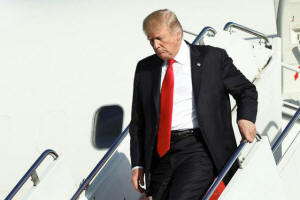|
As North Korea threat looms, Trump to
address world leaders at U.N.
 Send a link to a friend
Send a link to a friend
 [September 18, 2017]
By Michelle Nichols [September 18, 2017]
By Michelle Nichols
UNITED NATIONS (Reuters) - North Korea's
nuclear threat looms large this week over the annual gathering of world
leaders at the United Nations in New York, where diplomats are eager to
hear U.S. President Donald Trump address the 193-member body for the
first time.
North Korean diplomats will have a front-row seat in the U.N. General
Assembly for Trump's speech on Tuesday morning, which will touch on the
escalating crisis that has seen Trump and Pyongyang trade threats of
military action.
Despite his skepticism about the value of international organizations
and the United Nations in particular, Trump will seek support for tough
measures against North Korea, while pressing his "America First" message
to the world body.
"This is not an issue between the United States and North Korea. This is
an issue between the world and North Korea," Trump's national security
adviser, H.R. McMaster, said on Friday.
U.N. Secretary-General Antonio Guterres - who, like Trump, took office
in January - plans to meet separately with "concerned parties,"
including North Korean Foreign Minister Ri Yong-ho, on the sidelines of
the 72nd General Assembly.

"The solution can only be political. Military action could cause
devastation on a scale that would take generations to overcome,"
Guterres warned on Wednesday.
A week ago, the 15-member U.N. Security Council unanimously adopted its
ninth sanctions resolution since 2006 over North Korea's nuclear and
ballistic missile programs.
U.S. Ambassador to the United Nations Nikki Haley said U.N. sanctions
had banned 90 percent of the Asian state's publicly reported exports,
saying of Pyongyang on Friday: "This is totally in their hands on how
they respond."
Haley told CNN's "State of the Union" program on Sunday that Washington
had "pretty much exhausted" its options on North Korea at the Security
Council.
Ri is due to address the General Assembly on Friday.
IRAN
Some leaders will also push Trump not to give up on a 2015 deal curbing
Iran's nuclear ambitions in return for a lifting of U.N., U.S. and
European sanctions, while Israeli Prime Minister Benjamin Netanyahu said
it was time to "fix it - or cancel it."
The foreign ministers of Iran, the United States, Britain, Germany,
Russia, China and France - the parties to the agreement - are due to
meet on Wednesday ahead of an October deadline for Trump to tell
Congress if he believes Tehran is sticking to what he has described as
"the worst deal ever negotiated."

When asked on Friday what Moscow's message would be for Washington,
Russia's U.N. ambassador, Vassily Nebenzia, said: "Stay in the JCPOA
(the nuclear deal)."
A senior U.N. Security Council diplomat, speaking on condition of
anonymity, said: "We are faced with real uncertainties with respect to
North Korea and it's a bit dangerous ... to add another source of
uncertainty with respect to Iran."
Iran's Supreme Leader Ayatollah Ali Khamenei said on Sunday his country
would not be bullied by the United States and would react strongly to
any "wrong move" by Washington on the nuclear deal.
[to top of second column] |

President Donald Trump arrives at Morristown municipal airport for a
weekend at the Trump National Golf Club in Bedminster ahead of next
week's United Nations General Assembly, New Jersey, U.S., September
15, 2017. REUTERS/Yuri Gripas

Iran and North Korea will also feature heavily during a ministerial
Security Council meeting on Thursday, at the request of the United
States, to discuss the proliferation of weapons of mass destruction.
MYANMAR, CLIMATE, U.N. REFORM
While leaders and diplomats are also due to meet on longer-running
crises including Libya, Syria, South Sudan, Mali, Central African
Republic, Yemen and Iraq, a last-minute addition has been Myanmar,
where the United Nations has branded violence against Rohingya
Muslims as "ethnic cleansing."
Britain is due to host a ministerial meeting on Monday to seek a way
to get Myanmar authorities to end a military offensive in the
country's Rakhine state that has sent more than 400,000 minority
Rohingya Muslims fleeing to Bangladesh.
Following Trump's announcement that the United States would withdraw
from a landmark 2015 global agreement to fight climate change,
several high-level gatherings are planned on the sidelines of the
General Assembly to bolster the deal.
"Climate change is a serious threat," Guterres told reporters.
"Hurricanes and floods around the world remind us that extreme
weather events are expected to become more frequent and severe, due
to climate change."
U.S. Secretary of State Rex Tillerson appeared to hold the door open
for the United States to remain in the Paris climate accord "under
the right conditions."

"The president said he is open to finding those conditions where we
can remain engaged with others on what we all agree is still a
challenging issue," Tillerson said on CBS' "Face The Nation" program
on Sunday.
Trump will seek to boost support for reforming the United Nations,
which he once called "a club for people to get together, talk and
have a good time."
The United States is the largest U.N. contributor and Trump has
complained that Washington pays too much.
"The United Nations, of course, holds tremendous potential to
realize its founding ideals, but only if it's run more efficiently
and effectively," McMaster said on Friday.
(Reporting by Michelle Nichols at the United Nations; Editing by
Yara Bayoumy and Peter Cooney)
[© 2017 Thomson Reuters. All rights
reserved.]
Copyright 2017 Reuters. All rights reserved. This material may not be published,
broadcast, rewritten or redistributed.
 |